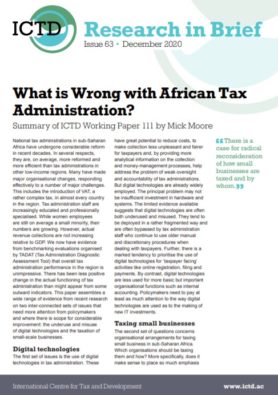Research in Brief 63
National tax administrations in sub-Saharan Africa have undergone considerable reform in recent decades. In several respects, they are, on average, more reformed and more efficient than tax administrations in other low-income regions. Many have made major organisational changes, responding effectively to a number of major challenges. This includes the introduction of VAT, a rather complex tax, in almost every country in the region. Tax administration staff are increasingly educated and professionally specialised. While women employees are still on average a small minority, their numbers are growing. However, actual revenue collections are not increasing relative to GDP. We now have evidence from benchmarking evaluations organised by TADAT (Tax Administration Diagnostic Assessment Tool) that overall tax administration performance in the region is unimpressive. There has been less positive change in the actual functioning of tax administration than might appear from some outward indicators. This paper assembles a wide range of evidence from recent research on two inter-connected sets of issues that need more attention from policymakers and where there is scope for considerable improvement: the underuse and misuse of digital technologies and the taxation of small-scale businesses.
